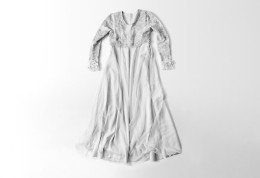Laia Abril
Catalan artist Laia Abril (b. 1986) presents her broad-ranging, research-based work On Rape – And Institutional Failure, which uses an assemblage of found and original photographs, reports, quotations, videos, and artifacts to explore the structures that make rape possible. Working across temporal periods, cultural practices, and media, Abril reveals the normalization of misogynist attitudes and behaviors in society and politics but does not resort to explicit depictions of sexualized violence.


A 2018 case of rape in Spain occasioned Abril's investigation. Occurring at the height of the #MeToo movement, the incident set off country-wide protests. Five men brutally raped a young woman and were later released on bail. When they were ultimately charged, it was not for rape, but merely for sexual harassment, which carries a lighter sentence. Against the backdrop of protests against a flawed system hostile to women, Abril explores why institutional failures on this scale occur, and how traditional assumptions, cultural influences, myths, and laws serve to shield perpetrators by reinforcing power dynamics and dependent relationships.
On Rape – And Institutional Failure is the second chapter in the artist's long-term project A History of Misogyny, in which she responds to manifold forms of systemic violence against women. Abril succeeds in allowing a deep empathy for victims of sexualized violence while inviting viewers to consider the complex relationship between experience, image, and language, as well as the limits of depicting trauma. The artist uses a moving political narrative to counter the feeling of silencing often experienced around the subject while simultaneously appealing to society’s sense of responsibility.

Abril's research-based practice makes her one of the most important next-generation artists working with archives, written testimonies, and original photographs today. She uses multilayered narratives to make visible complex and suppressed taboo themes today. C/O Berlin presents the artist's first institutional solo exhibition in Germany in Collaboration with Les Filles du Calvaire, Paris.
Laia Abril (b. 1986) is an interdisciplinary Catalan artist. After training as a journalist, she took part in photo courses at the International Center of Photography in New York, concentrating on uncomfortable and suppressed realities around sexuality, eating disorders, and gender equality. For her work, she has been awarded the National Photography Prize 2023 by the Ministry of Culture and Sport of the Government of Spain. She received the FOAM Paul Huf Award (2020) and a Magnum Foundation grant (2019), and was a finalist for the Deutsche Börse Photography Foundation Prize (2019). Abril’s works are held in many collections around the world, including Centre Pompidou, Paris; Museum of Contemporary Photography, Chicago; Photo Elysée, Lausanne; Fotomuseum Winterthur; Victoria & Albert museum, London; and Foto Colectania, Barcelona. On Abortion, the first chapter in her long-term project A History of Misogyny, has been exhibited in over ten countries, including the Finnish Museum of Photography, Helsinki (2019); The Photographers’ Gallery, London (2019); and at Rencontres d'Arles (2016). Her books On Abortion: And the Repercussions of Lack of Access (2018) – which was awarded as best book of the year by Aperture/Paris Photo – and On Rape: And Institutional Failure (2022) were published by Verlag Dewi Lewis.
If you are looking for support or further information on the topic of sexualized violence, you will find a selection of contact points here.





